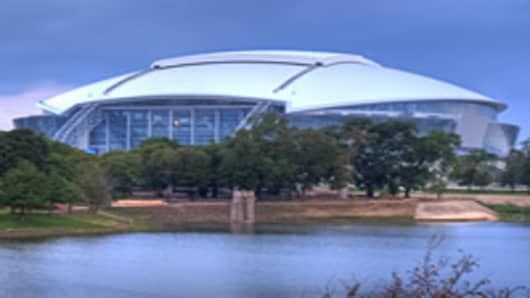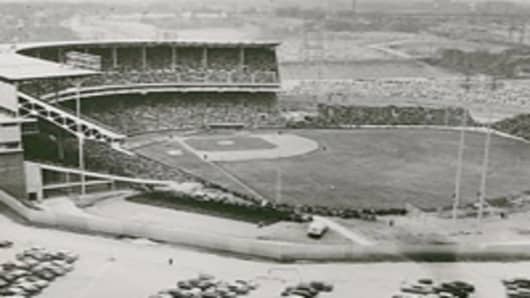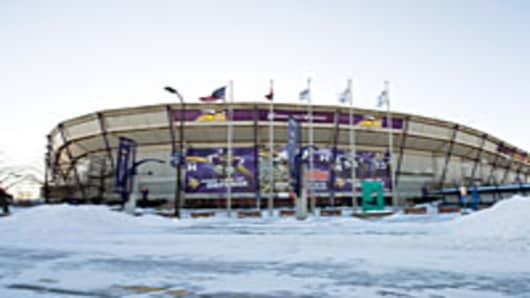Some 80,000 people are expected to watch Super Bowl XLV inside Cowboys Stadium in Arlington, Texas. Finished in 2009 at a cost of $1.15 billion, it's one of the most expensive sport 'palaces' ever built.
To help finance the stadium's dozens of luxury suites, upper end eateries—and the world's largest high-definition video screen—local officials increased the sales tax, as well as those on hotel rooms and car rentals while floating some $325 million in bonds.
But as states face budget busting deficits—an estimated total of $140 billion for all 50 next year—the game clock may have expired on subsidized stadiums.
"With the Recovery Act funding nearly exhausted, states and cities are being forced to downsize and prioritize their spending," says Alan Wohlstetter, who chairs the infrastructure practice at the law firm Fox Rothschild. "Will cities replace a 100 year old school, a 50 year old bridge or 18 year old sports stadium? My bet is not on the sports stadium."
"For cities in states that are struggling financially, sport project spending makes a bad situation worse," says Emily Sparvero, assistant professor at Temple University's Sport Industry Research Center.
Philadelphia is a good example, says Sparvero. "The city has a high debt burden, which is due in part to the funding it provided for the new stadiums for the NFL's Eagles and Phillies (baseball team). The city is now perceived as a very high credit risk, which makes it more difficult and costly to issue additional bonds for money it needs now."
While public funding may be in short supply, there's no shortage of teams looking for new or re-furbished stadiums.
The NFL's Minnesota Vikings want a new stadium, especially after part of the roof of the team's current home field collapsed under the weight of a heavy snow storm in December.
The Atlanta Falcons have been trying to move from the Georgia Dome they share with Georgia State University's college football team, to a place of their own for the past three years.
There are even plans in Los Angeles to build a stadium to attract an NFL franchise. The city hasn't had a pro football team since 1995— after the Raiders and Rams moved to Oakland and St. Louis, respectively. Several pro baseball teams, like the Chicago Cubs, want their stadiums updated.
Turning any one of those field of dreams into reality won't be easy, say experts.
"It's difficult even in the best of times to fund a sports stadium," says Ross Taylor, a lawyer who specializes in corporate and lease financing at the firm, Kelley Drye & Warren. "And these days it may be near impossible."
Public assistance hasn't always been a building block for sport facilities. It wasn't until after World War II that subsidized stadiums became a game plan.
Decades before the phrase became a cliche, Milwaukee, Wisconsin took an 'if you build it, he will come' approach in 1950 to get a major league baseball team by building a stadium with public money to woo the then Boston Braves—who wanted a new stadium.
The Braves did go to Milwaukee—the first time a MLB team moved—only later to leave Milwaukee for Atlanta, Ga.
As loyal fans know, other sport franchises did the same. Baseball's Brooklyn Dodgers and New York Giants, the NFL's Rams, Raiders, Colts and Cardinals and the NBA's Seattle Supersonics—recently reborn as the Oklahoma City Thunder—are all examples of teams moving to cities that used public funds to help build new or better facilities.
To many, team migrations confirm the overwhelming power of pro athletics. Others say it's just the business of sports.
"Moving a club is never easy or simple," says Irwin Raij, a partner and vice chair of the sports industry team at Foley & Lardner law firm and has handled recent stadium financing. " I think teams would prefer not to move but they are under pressure to improve in order to keep fans coming and sign free agent players. You need good stadiums for that."
Do cities benefit from sports teams?
Financial Benefits of Sports Teams
The pubic funding issue raises a central question: Is having a pro franchise worth the cost of public financing? Experts are clearly divided.
Marc Edelman, a professor at the Barry University School of Law in Orlando, Florida, who has studied sports teams and their economic impact, says no.
"For the most part, very few cities get a financial benefit from having the teams," Edelman argues. "The jobs and revenues that are promised don't turn up. People go home after games and if they didn't spend their money there, they'd spend it someplace else. Cities that have given tax benefits or leasing deals end up short changed. It's mostly the happiness of the fans."
Edelman adds that high-priced stadiums only benefit the upper echelons of society.
"An NFL game costs well over $250 for four people. Costs for most sports tickets have skyrocketed in part because of the new stadiums. They're only benefiting the rich," concludes Edelman.
Other analysts say the benefits go far beyond the fan base.
Much depends on the market and what any city can afford to spend, says Dan Grigsby, chair of the national sports law group at Mangels Butler & Mitchell, who's represented teams like the NBA's Los Angeles Lakers in stadium negotiations.
"But games bring in millions of dollars to the surrounding areas," Grigsby adds. "Places near the stadiums really see the benefit on game days. New stadiums also create jobs even if temporary. The loss of a team would have significant economic impact."
Politicians in the Crosshairs
All this leaves local politicians in a no-win position. If they don't help fund the stadiums they can lose the team—and votes of irate fans.
If they approve stadium funding, they can still lose at the polls, as was the case with those in Seattle, Washington who OK'd public funds to help construct Qwest Stadium in 2002 for the pro football Seahawks.
Carl Wimmer, a Republican state representative in Utah, voted against a bill in 2007 to use public funds to help build a stadium for the professional soccer team, the Salt Lake City Real. The bill just narrowly passed, but not before tempers flared.
"The outcry against using public funds was tremendous," says Wimmer. "I expect it to get even louder now across the county. You see a lot of rosy projections used to sell these type of things but more often than not, they fall quite short."
As for the NFL's Vikings and Falcons, their new stadiums are still on the drawing boards; the Minnesota legislature voting down the most recent proposal, while the Falcons are stuck in the Georgia Dome until the bonds used to finance its construction are paid off.
Los Angeles officials have just OK'd a commission to look into building a football facility—with no guarantees of any money. (The city just announced a naming rights deal for the proposed stadium with Farmers Insurance worth $700 million.Officials continue to say "not a dime of taxpayer money" will be used for the project.)
While no one is predicting the end of public funds for building stadiums, experts say a new playbook has to be drawn up.
"Governments and private business need to be more creative," says Lee Walko, a lawyer at Brennan, Manna & Diamond whose focus includes real estate and corporate management.
"One way is more use of corporate naming rights," says Walko. "The private sector has to come up with more money in these times. For their part, governments can look at long term leases for land to be used as a training facility or other uses at favorable terms. There's also multi-use stadiums instead of just single teams as tenants."
"You probably won't see many bond issues for buildings or huge tax benefits being giving away," Harley Lance Kaplan, an economist and certified financial planner at Beta Industries in Sherborne, Massachusetts.
In the end, however, there's more involved in the equation than money.
"It's like the movies in the 1920's and 30's during the Depression," says Kaplan. "People loved to go to them to escape. As long as sports does that too, you will have stadiums built."






